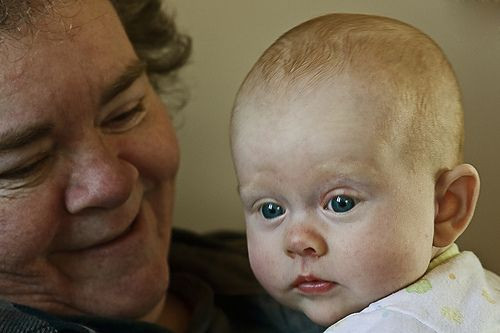Grandmothers May Face Greater Risk For Depression If Caring For Grandchildren Full-Time

Recruiting a grandparent to help raise a child often serves to deflect certain costs, be they time or financial, and usually it works out for the best: parents find time to earn more money and the grandparent rekindles an old joy in parenting. In some cases, however, prolonged exposure to the stress of raising a child has grandmothers slipping into deep depression, one study finds.
The findings come from Case Western Reserve University’s Frances Payne Bolton School of Nursing, where researchers tracked the well-being of 240 Ohio grandmothers from different cultural backgrounds and circumstances for six-and-a-half years. Published in Nursing Outlook, the study is one of the longest-running analyses of mental health among grandparents.
“Although we expected the primary caregiver grandmothers raising grandchildren would have more strain and depressive symptoms,” said Dr. Carol Musil, professor of nursing, in a statement, “we were surprised at how persistent these were over the years examined in the study.”
U.S. Census data places the number of households with at least one grandparent living in the house at around 6.2 million, or 5.3 percent of all U.S. homes. Musil added that some one million grandparents raise grandchildren in a home where the child’s parents do not reside.
Her team’s study tracked the health and well-being of grandmothers who raised children 16 years and younger full-time, stratifying them according to living situation. Grandmothers fell into one of three categories: those who are full-time caregivers for their grandchildren, those who live in multigenerational homes, and those who are non-caregivers. Selections were made at random throughout Ohio in order to develop a representative sample of urban and suburban cases. The average age at the study’s onset was 57.5 years old.
Depression is defined as a chronic mental illness, characterized by diminished interest in activities, despondency, and overall feelings of indifference and hopelessness. Experiencing only one episode of depression puts an individual at a 50 percent risk of experiencing another, according to the Centers for Disease Control and Prevention. Depression’s cause is still a mystery; however, chemical imbalances among monoamines — e.g. serotonin, norepinephrine, dopamine — have long been implicated in a person’s steep decline in mental health.
“An important aspect of our advanced monoamine model is that individuals with depression lose chemicals like serotonin and dopamine at different rates based upon transporter density,” Dr. Jeffrey Meyer told Psych Central. “This helps explain why one person with depression may experience loss of appetite while another may not. And some people have more severe symptoms than others.”
Musil and her team found that full-time caregiving had “significant effects on depressive symptoms and intra-family strain but not on resourcefulness,” they wrote in their report. The upside was that grandmothers who experienced depressive symptoms responded well to doctors’ encouragements to seek help, especially those who raised their own grandchildren.
In the end, Musil pushed for greater attention directed at mental health disorders in the elderly, particularly those who confront unique challenges because of raising a child. The emotional, cognitive, and physical strain of the child-rearing process must be handled deftly and gracefully.
“They need support from others,” Musil said, “but the most important thing is to maintain and perhaps develop new cognitive and behavioral skills and approaches for handling some very challenging family issues.”
Source: Musil C, Jeanblanc A, Burant C, Zauszniewski J, Warner C. Longitudinal analysis of resourcefulness, family strain, and depressive symptoms in grandmother caregivers. Nursing Outlook. 2013.



























